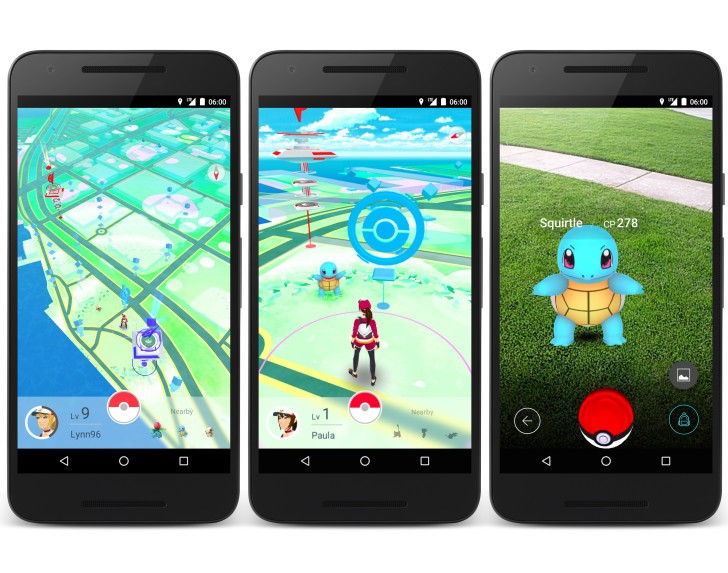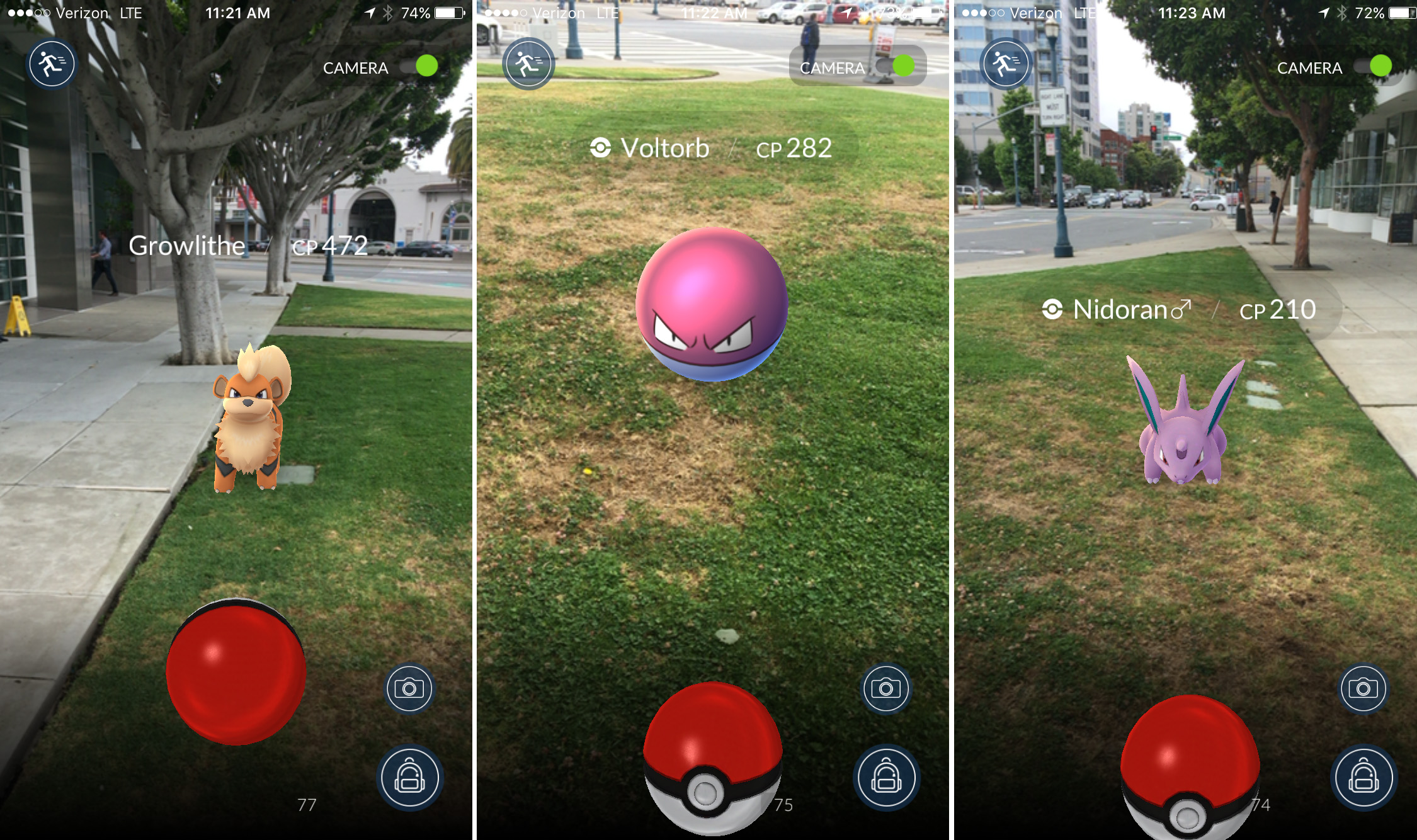Gotta catch all your rights and obligations too
Pokémon GO went live less than two weeks ago in just a few countries, but it has already become one of the phenomenons of the year. In fact, it already is the biggest mobile game ever in USA and it is quickly approaching the level of use of services such as Google Maps and Snapchat. All of that in less than two weeks.
The concept is classic Pokémon: you gather the best Pokémon to train them later and compete against different trainers and through tournaments around the world. The huge difference here is that the world is not virtual anymore, now the real world is the playground.
The thing is that thanks to augmented reality, the Pokémon do not live in a virtual world now. Instead they live and walk in the real world. For example, the garden of your neighbor. Through our mobile devices we can locate them (the camera + geolocation), catch them, train them and then compete against the rest of the world.
That means that the immersion and interaction goes through the roof, because to catch the Pokémon you have to physically move to the places where the app points out that they are living. Something that has generated more than a few complaints from players with disabilities, whose options to play get very limited.
When all the planet is the game board and the player needs to move around to play, plenty of things can go wrong. That’s why we already have plenty of crazy stories since the launch of the game:
- Places banning the hunting of Pokémon
- Infidelities being discovered through Pokémon GO
- The Mayor of Rio asking for the use of the game during the Olympic Games
- Or cops and robbers taking advantage of the excursions of the players
And that’s just the beginning…
But let’s go to the point, what do the terms and conditions of Pokémon GO say? Well, its Terms of Service, Privacy Policy, Copyright Policy and Trainer Guidelines have some very interesting aspects.
Let’s go for it!
13 details about its terms and conditions
1.- The agreement is signed with Niantic Labs, a company born within Google that would become independent in 2015. That year, and with the announcement of the development of Pokémon GO, Google, Nintendo and The Pokémon Company invested in the growth of the company. So now the three of them are part of Niantic Labs.
2.- The use of Pokémon GO is personal and no commercial. Therefore, all those small and medium businesses interested in using it to gain new clients would be infringing its terms and conditions. In any case, the sponsored locations are coming.
3.- To play it you have to be at least 13 years old. Having said that, the minors under 13 years need that their parents register at The Pokémon Company International through the Trainer Club. During that process, the username, email and date of birth has to be filled. That way the parents can consent. In addition, if you are a USA resident, you have to verify that you are the father o mother of the minor through an specific process. Then, if the parents want to remove the consent for an account of a minor under 13 years, they can use this form.
4.- If you want to access the service you need a Google, Facebook or Pokémon Trainer Club account. The required personal information will be gathered from the data of these accounts (for example the email). Then the Pokémon GO account can be created. In the case of a Trainer Club account, the date of birth, name and surname will also be needed. The access to the service through third party accounts, such as Google, created some uproar in relation to the privacy of Pokémon GO. The reason was that using a Google account implied full access to the content of it (that meant way more than just the email). In any case, the bug was fixed a few days later.
5.- The data compiled by the game, through the different phases, is: username or real name (according to the option chosen by the user), country, language, the data gained through cookies and beacons (such as web traffic and aggregate use), the IP, the user agent, the browser used, operating system, web of origin, search terms, time invested, clicked links and something very important from a privacy point of view, the location (through GPS, Wifi triangulation or phone towers).
 6.- Who has access to the data and how it is shared? Let’s take a look to an important privacy aspect:
6.- Who has access to the data and how it is shared? Let’s take a look to an important privacy aspect:
a) With The Pokémon Company (the International too) personal data is shared (from adults and minors under 13 years old) to solve any problem produced during the register process. The Pokémon Company International also compiles the data about the consent given by the parents in relation to minors under 13 years registered on the game.
b) With service providers that allow the proper functioning of the game (for example, web hosting), personal data is shared (from adults and minors under 13 years) just to provide the service.
c) The non-personal data from adults (the minors under 13 years are excluded) is shared for research, analytics, demographic profiling and other similar purposes.
d) If a third party acquires the company, personal data (from adults and minors under 13 years) could be shared. In any case, a notice would be sent 30 days prior to the exchange, so the user could oppose to it.
e) With governments, law enforcement officials or private parties to comply with the law, for example a legal process.
f) In any case, you can refuse further collection, use or disclosure of your personal data (from minors under 13 too). For example, by preventing that the personal information of an adult or minor user ends up in USA (the place where the personal data is transferred and processed). Something like that can be requested at: pokemongo-privacy@nianticlabs.com However, that possibly means that the access and use of Pokémon GO gets very limited. Therefore, it is more like playing to the gallery…
7.- The content shared by the user through the app is licensed to Niantic Labs perpetually, on a non-exclusive and irrevocable way, with the option for a possible transfer and/or a sublicense, free of charge and on a worldwide scale. So, the content is shared veeeery generously.
8.- The Pokémon obtained can be exchanged for others but within the service and not for virtual money, real money, real goods or real services. In any case, there are already users taking advantage of the business side of Pokémon GO (for example, «taxi» services to carry someone to the location of a Pokémon).
9.- The game obviously includes micropayments, but they have to be done by 18 years old users or users under that age but with parental consent to make the purchase. The micropayments allow refunds, but only until the purchase is completed. Once is done, there is no option.
10.- If a Pokémon GO account is not used during 1 year, the account is deleted and everything related to it will be lost. In any case, a closed account will be kept «for a reasonable amount of time from a commercial point of view». If the virtual money or in-game content is expected to be interrupted or changed some way, a notice will be sent 60 days in advance.
11.- There are plenty of forbidden conducts, but taking into account the kind of game that Pokémon GO is, there is an important one: you should not try to access a place or location where you don’t have the right to enter. It is kind of obvious, but definitively something to remember because there are already places that are banning the access to Pokémon GO players. In fact, if you don’t want your home or business appearing in the map of Pokémon GO as a gym, Pokéstop or whatever, Niantic Labs is providing a form just for that. The form can also be used to alert about dangerous or inappropriate places shown on the map as events or items.
12.- The online and offline communications of the user with different players, are entirely its responsibility. In fact, Niantic Labs says that they don’t investigate or ask about the records or precedents of a user.
13.- If there is a problem, the laws from California will the be ones to take into account. In addition, unless the user opts-out of it, it is subject to an individual arbitration without an option to go to court. Both conditions are unfair according to European law, but they would be applicable to a user from USA, for example.
In summary, Pokémon GO is quite reasonable on the terms and conditions subject. It has a couple of details worth mentioning: a) the concern about the consent from the parents on users under 13 years and b) the possibility to refuse the collection or use of the gathered personal data (although in practice it limits a lot the game). Another interesting point is the detailed regulation of the micropayments and the (non) commerce of virtual items for real goods and services (although that is already happening). Google being part of Niantic, although on a small scale, could cause some concerns about the use of the personal data and the privacy of the service. However, nowadays there isn’t any big red flag in this sense. Finally, the non commercial use of the app is going to cause more than a few troubles, seeing the potential for small and medium services.
In short, there is no doubt that this is one of the phenomenons of the year. So, have fun and catch them all.
Happy poke-excursion!
—–

